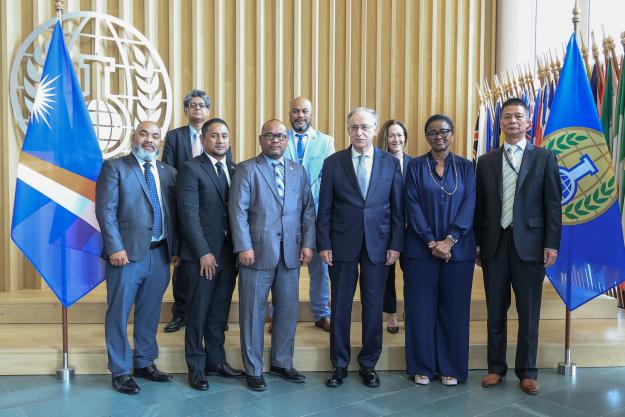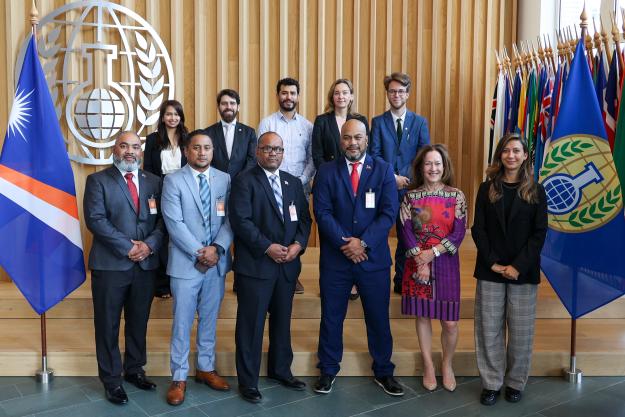
High-level Marshallese delegation meets with OPCW experts and leadership, including Director-General Ambassador Fernando Arias and Deputy Director-General Odette Melono, on 16 July 2025 in The Hague.
THE HAGUE, Netherlands—13 August 2025— A high-level delegation from the Republic of the Marshall Islands visited the Organisation for the Prohibition of Chemical Weapons (OPCW) to accelerate efforts toward adopting national legislation that will be crucial for full implementation of the Chemical Weapons Convention (CWC). The three-day visit represented a key milestone in the Marshall Islands’ efforts to translate the Chemical Weapons Convention’s obligations into enforceable national legislation.
The OPCW’s capacity building programme is supporting this crucial phase through the Influential Visitors Programme, which offers tailored advocacy and legislative guidance to States Parties at a critical stage of adopting national implementing measures.
Organised by the OPCW’s International Cooperation and Assistance Division, the Programme provided a focused platform for a high-level Marshallese delegation to engage in discussions with OPCW experts and leadership, including Director-General Ambassador Fernando Arias and Deputy Director-General Odette Melono. Conversations centred on key legal and policy considerations anticipated during the legislative process, such as jurisdictional scope, extraterritoriality, and tailored approaches suited to national context.
Dedicated national legislation ensures that any activity prohibited by the Chemical Weapons Convention can be effectively detected, deterred, and prosecuted under the rule of law, while also enabling responsible scientific exchange and the peaceful use of chemistry.

Marshall Islands seeks to advance legislation to strengthen chemical weapons controls in the Pacific
The visiting delegation included the Vice Speaker of Parliament, Mr Isaac Zackhras; the Presidential Envoy for Nuclear Justice and Human Rights, Mr David Anitok; the Parliament’s Legislative Counsel, Mr Joe Lomae; and the Chairperson for the Standing Committee on Foreign Affairs and Trade, Mr Joe Bejang.
Drawing on their experience in supporting other States Parties through similar legislative adoption processes, OPCW experts facilitated focused exchanges on legal and policy issues that may arise during the final stages of the lawmaking in the Marshall Islands. The discussions also explored effective advocacy strategies to help build broader parliamentary support and to raise awareness of CWC legislation among fellow lawmakers.
“As we move forward, we are committed to working in close partnership with the OPCW and with fellow Member States,” said Committee Chair Bejang. “We recognize that full and effective implementation of the Convention is not only a legal obligation, but a moral one—essential to protecting future generations from the horrors of chemical warfare.”
The visit is a continuation of the OPCW’s increasing engagement with Pacific Islands through regional and global capacity-building initiatives.
Background
The Marshall Islands has been a State Party to the CWC since 2004. The forthcoming bill will ensure that the Government can effectively discharge its responsibilities under the Convention—a significant step for a nation with a strategic location in the Pacific and one of the world’s largest ship registries, overseeing thousands of vessels engaged in international maritime shipping and trade.
As the implementing body for the Chemical Weapons Convention, the OPCW, with its 193 Member States, oversees the global endeavour to permanently eliminate chemical weapons. Since the Convention’s entry into force in 1997, it is the most successful disarmament treaty eliminating an entire class of weapons of mass destruction.
In 2023, the OPCW verified that all chemical weapons stockpiles declared by the 193 States Parties to the Chemical Weapons Convention since 1997 — totalling 72,304 metric tonnes of chemical agents — have been irreversibly destroyed under the OPCW’s strict verification regime.
For its extensive efforts in eliminating chemical weapons, the OPCW received the 2013 Nobel Peace Prize.
